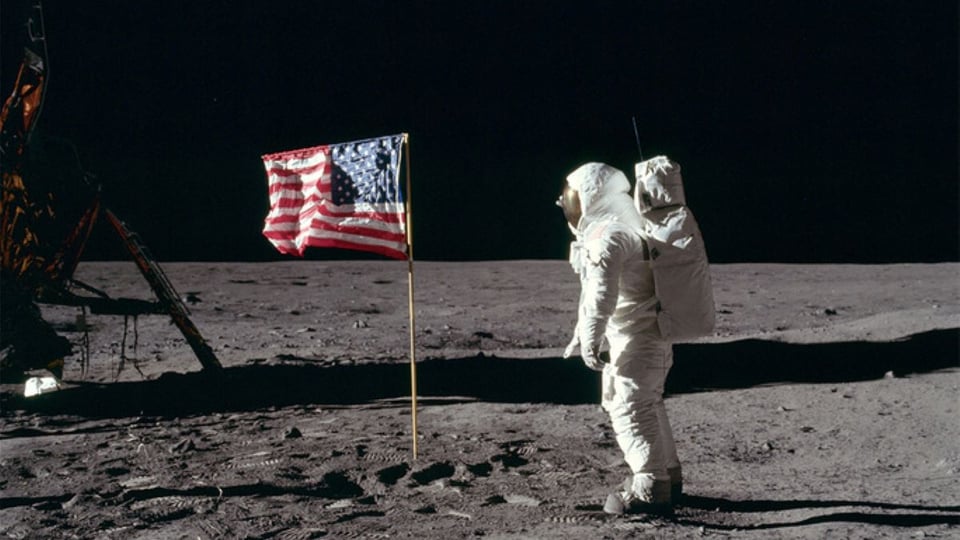Moon Landing: Greater Leaps Yet to Come?
Half a century has passed since the first man stepped onto the surface of our moon. How did that event change the world? What can we expect in the future?

Space travel has fired up our imaginations for many generations. The idea of traveling off this earth and visiting other places in space has been explored in many science fiction books, movies and television shows.
Many older adults today grew up watching space adventure on shows like Buck Rogers and Flash Gordon. Then came Star Trek and all the various spin-off shows and movies that have entertained and intrigued generations of fans. And the list could go on and on. This all illustrates the fascination human beings have with exploration of what’s “out there” in the vast reaches of space.
Baby steps into space
The first step toward traveling to other planetary bodies was to put a man on our own moon—in astronomical terms, a trip just “around the block.” Fifty years ago, on July 20, 1969, that was accomplished when astronauts from the Apollo 11 mission successfully landed a lunar module on the surface of the moon.
About six hours after the landing, mission commander Neil Armstrong stepped onto the lunar surface, something no human being had ever done before. At that moment he uttered the now famous line: “That’s one small step for [a] man, one giant leap for mankind.”
Twenty minutes later, pilot Buzz Aldrin joined him. They spent 21½ hours on the surface of the moon before taking off to rejoin the Columbia spacecraft for the return trip to earth.
Their feat accomplished a goal set by U.S. President John Kennedy eight years earlier—to put a man on the moon before the end of the decade.
Fifty years later it is a bit difficult to comprehend the degree of anxiety the nation felt as the Saturn V rocket blasted off the launchpad at Kennedy Space Center in Florida. The space program had suffered its share of mishaps, including the devastating Apollo 1 disaster that killed three astronauts just 2½ years earlier.
That anxiety was replaced by elation when the entire mission went off as planned, and the three astronauts (including Michael Collins, who stayed aboard Columbia) splashed down safely on earth after eight days in space.
The impact of the space race
The “giant leap for mankind” could hardly have been understood at that juncture. A barrier had been broken. No longer was space travel something relegated to science fiction. It was now a reality.
But making that trip was not as simple as it appears in science fiction. Much of the technology required to safely put a man on the moon and bring him back had not existed even a decade earlier, so the pace of innovation and development was intense! And while human feet have not yet stepped on a planetary body beyond our moon, the effort at that time has had a profound impact on society.
All this growth and development is a testament to the creativity and mental power God gave mankind.
Looking back at the leaps in technology, some estimate that the U.S. space program of the 1960s sped up major technological advancements by 10 to 20 years. In fact, the trickle-down effects of those efforts have led directly to many things we take for granted today, including cellular telephones, wireless equipment and technology, personal computers and tablet computers. While many of us remember when those things didn’t exist, today we find it hard to imagine living without them!
All this growth and development is a testament to the creativity and mental power God gave mankind. Our Creator gave us the ability to reason, plan, design and then implement those designs.
The Bible speaks about a “spirit in man” that God has given human beings that allows us to know “the things of a man” (1 Corinthians 2:11). It is this human spirit that sets us apart from all other life-forms and gives us the amazing mental abilities we have.
The dark side of human creativity
But we should never forget that there is also a dark side to the incredible creativity and power of the human mind.
Following the cataclysmic flood at the time of Noah, the earth’s population once again began to grow. Men decided to unite themselves by building a great city and tower (Genesis 11:4). Some speculate this was done in an attempt to protect themselves from another flood, perhaps even trying to reach up to the abode of God Himself in the heavens! In other words, they were trying to build something that would allow them to defy the Creator, should He decide to flood the world once again.
In Genesis 11:6 God said, “Indeed the people are one and they all have one language, and this is what they begin to do; now nothing that they propose to do will be withheld from them.”
It seems that technology was advancing faster than God had intended, so He decided to slow it down by confusing the languages and encouraging them to spread out as different civilizations across the earth.
For thousands of years, man has been allowed to develop greater technological achievements—one of the greatest being putting a man on the moon. But in the last century we have also developed fearsome weapons that give us the ability to end millions of lives in minutes—and to even destroy all life on this planet.
Whether it’s developing a way to travel to the moon or kill millions of people, it all comes from the creative power of the human mind.
A brighter future
The apostle Paul warned that in order to avoid the destructive potential of the human mind, we have to bring “every thought into captivity to the obedience of Christ” (2 Corinthians 10:5). We must learn to control this powerful mind God has given us! Its power should be tapped—but within the confines of the laws revealed by God in the Bible.
Fifty years ago, mankind’s ability was put on full display when we sent men to the moon and then brought them safely back home again. As fantastic as that feat was, it is nothing compared to what we will be able to do in the future if we learn to control our minds, building righteous character in the process.
An astronaut may never venture farther into our solar system, and we may not travel as deep into space as many science fiction characters have. But that doesn’t mean God intends for us to remain earthbound forever. The Bible doesn’t give us a lot of details about what lies in the future, but it does promise that God’s people will “inherit all things” (Revelation 21:7). That includes space and whatever lies beyond it that we have yet to be able to see with a telescope.
We can’t even grasp what lies in our future. “But as Scripture says: ‘No eye has seen, no ear has heard, and no mind has imagined the things that God has prepared for those who love him’” (1 Corinthians 2:9, God’s Word Translation).
It appears we will one day be able to “boldly go where no man has gone before.”
Date Posted: July 17, 2019



